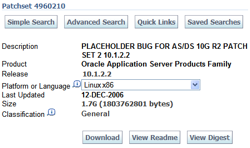
We wrapped up a new certification over the long weekend, but it’s a bit of a strange one. We had originally not planned to do this certification at all, for reasons that might be clearer by the end of this article.
However, a suitably large number of you have requested it explicitly, so we revisited that decision. This is an object lesson in the principle that it never hurts to ask. On to the actual certification announcement:
Oracle Application Server and Oracle Developer Suite 10g Release 2 (10.1.2) Patch Set 2 (10.1.2.2.0) (Patchset 4960210) is now certified for use with E-Business Suite Release 11i and 12
environments. This certification covers all platforms for which this OracleAS patchset is available.
Now for the odd part…
Supported External Oracle Application Server 10g integrations
As many of you know, it’s possible to integrate Oracle E-Business Suite Release 11i and 12 environments with external Oracle Application Server 10g instances for the use of the following optional services:
Oracle Single Sign-On and Oracle Internet Directory
Oracle Portal
Discoverer
Web Cache
Web Center (for Oracle E-Business Suite Release 12 only)
Oracle Business Intelligence Enterprise Edition
For pointers to the documentation for these optional Release 11i and 12 integrations, see the respective “Getting Started With…” articles listed below in the Related Articles section.
Some of you use these external Oracle Application Server 10g instances to provide these services to other applications across your enterprise. The most common example of this is Oracle Single Sign-On, which can be used by both the E-Business Suite as well
as your custom applications. Some of these custom applications may be built using Oracle Application Server 10g, say, Oracle Developer Suite 10g 10.1.2.0.2.
Upgrading? Decisions, decisions, decisions…
This is where things get interesting, based upon the current Fusion Middleware releases and codelines. I find it confusing, so don’t feel badly if you’re having trouble keeping up, too. I’ll try to recap the key points here, but I’ve previously covered this
in rather-painful detail in this older article.
There are two notable upgrade scenarios:
Scenario 1: SSO-enabled E-Business Suite
In this first scenario, you’re using an external Oracle Application Server 10g 10.1.2.0.2 for Single Sign-On (SSO) or Oracle Internet Directory (OID). If you want the latest SSO or OID updates, you must upgrade your Oracle Application Server 10g
environment to either 10.1.4.0.1 or 10.1.4.2 because there are no SSO or OID updates in Oracle Application Server 10g 10.1.2.2.It’s important to note that if you’re only using your Oracle Application Server 10g environment for Single Sign-On purposes, there’s no point in applying the 10.1.2.2 patchset. It certainly doesn’t hurt to apply Oracle Application Server 10g 10.1.2.2 to
your external instance, but there’s no benefit to E-Business Suite users in this scenario.Scenario 2: Oracle Application Server 10g used for something else
In this second scenario, you’re using an external Oracle Application Server 10g 10.1.2.0.2 for Single Sign-On (SSO) or Oracle Internet Directory (OID) as well as for other purposes. For example, you might also be using that same Oracle Application
Server 10g instance for custom application development using, say, Oracle Developer Suite 10g 10.1.2.0.2. If you want the latest fixes for Oracle Developer Suite delivered by 10.1.2.2, then you can apply this patchset to your environment.In this case, your E-Business Suite integration only “cares” about the Single Sign-On and Oracle Internet Directory components. There aren’t any SSO or OID fixes in Oracle Application Server 10g 10.1.2.2, so your E-Business Suite integration is
completely unaffected by this patchset.
Go to the Source
There are other possible reasons to apply this patchset. For example, you might be running Portal 10.1.4.0.0, or Oracle Business Inteligence Tools 10g Release 2 (10.1.2.0.2). The very best way of determining whether you need to apply Oracle Application
Server 10g 10.1.2.2 is to review the patchset’s official README:
References
- Integrating Oracle E-Business Suite Release 12 with Oracle Internet Directory and Oracle Single Sign-On (Metalink Note 376811.1)
- Installing Oracle Application Server 10g with Oracle E-Business Suite Release 11i (Metalink Note 233436.1)
Related Articles
